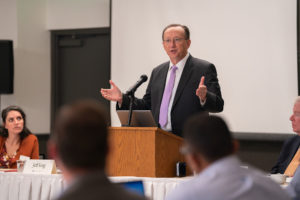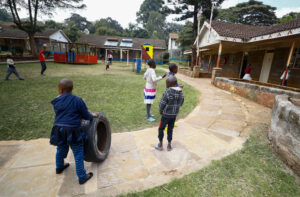
SANTA ANA, Calif. (BP)–Vietnam’s Communist Party has taken steps through its key Central Committee to regulate how religion is practiced in the country, Compass Direct news service reported Jan. 28.
Four small children were killed, three pregnant women miscarried and 100 worshipers were rendered unconscious in Vietnam’s Lai Chau province, according to a Jan. 22 report from International Christian Concern, when police in sprayed an unknown gas into a Dec. 29 service in the village of Huong Nha.
Police “insisted that everyone leave the worship service,” recounted International Christian Concern, a Washington-based advocacy organization for persecuted Christians worldwide. “Unwilling to compromise their God-given freedom of worship, the believers remained” and were sprayed with gas, ICC reported.
“Efforts to eliminate Christianity from the tribal communities of Vietnam continues as a goal of the Vietnamese government,” ICC stated. “In recent months, three [ethnic] Montagnard pastors of the Dak Lak province were imprisoned and subsequently killed by lethal injection in their cells at Buonmathuot. In addition, 56 [ethnic] Ede and Mnong pastors in the Central Highlands disappeared. Furthermore … 354 of the 412 churches in Dak Lak province have been forcibly closed by the government and more closures are expected to follow.”
Meanwhile, according to Compass Direct, a California-based news service reporting on the persecuted church, the Central Committee of Vietnam’s Communist Party went into its Seventh Plenum (general assembly) on Jan. 13 promising to carefully address the sensitive issues of religion, land and ethnic minority unrest. The committee emerged nine days later, on Jan. 21, to announce that it had passed four new resolutions, including one to better control religion.
Deputy Prime Minister Vu Khoan described the action as the first time the Central Committee has passed a resolution specifically on religion, Compass Direct reported, noting that, usually, religious matters are left to lower, less powerful governmental bodies.
The issues arose because of minority unrest in Vietnam’s Central Highlands two years ago over confiscated land and lack of religious freedom, to which Vietnam responded in a heavy-handed way, Compass Direct reported. The government has been accused by organizations such as Human Rights Watch and Amnesty International of serious human rights violations of Montagnards, a collective name for Vietnam’s many of the minority tribal groups inhabiting the Central Highlands. Compass Direct estimated in December that the number of churches disbanded by authorities had risen to more than 400 in Dak Lak province, and believers among all minority Christians were being falsely accused of involvement in a political plot to overthrow the regime.
According to an official communique provided to Compass Direct by Vietnamese sources, the resolution on religion appears aimed at Vietnam’s six approved religions. It calls for the establishment of cells of Communist Party members within the approved religious organizations.
A Jan. 27 South China Morning Post article described the development as “cementing the control of religion from within.”
Vietnam observers told Compass Direct this will cause problems for the Evangelical Church of Vietnam (South), which received legal recognition two years ago. So far, the ECVN(S) has successfully resisted being controlled by a small number of “government-friendly” leaders who have close relations with the Bureau of Religious Affairs.
Protestant Christian leaders, many of whom belong to groups still considered illegal by the government, express even more alarm, Compass Direct reported. They reason that if “legal” religious organizations will be subject to an “increase of state management and guidance of religious affairs,” then pressure will increase on the majority of Protestants, especially Montagnard and Hmong Christians, whom the government considers illegal. These groups have long been subject to Vietnam’s internal policy on religion, with its systematic campaigns of harassment, control, repression and persecution.
Vietnam also is calling on religious believers to “volunteer” in the struggle “to foil hostile forces who abuse religious and ethnic minority issues to sabotage the great national unity and act against the political regime,” Compass Direct reported. Any questioning of the regime’s policies is illegal and considered a hostile activity.
It is certain that the effects of harsher scrutiny of religion will serve to drive even more religious activity underground, Compass Direct predicted — at a time when Vietnam has been severely criticized by governments and by human rights organizations, and has been on a public relations blitz to try to convince the world that it is making steady progress in the area of human rights.
“Vietnam is clearly going backwards” is how one longtime Vietnam observer summarized recent events to Compass Direct. “When you hear words like ‘guidance’ and ‘control’ and ‘hostile forces’ in connection with religion, you can be sure people of the Christian faith will suffer even more.”
–30–
Compiled by Art Toalston.















